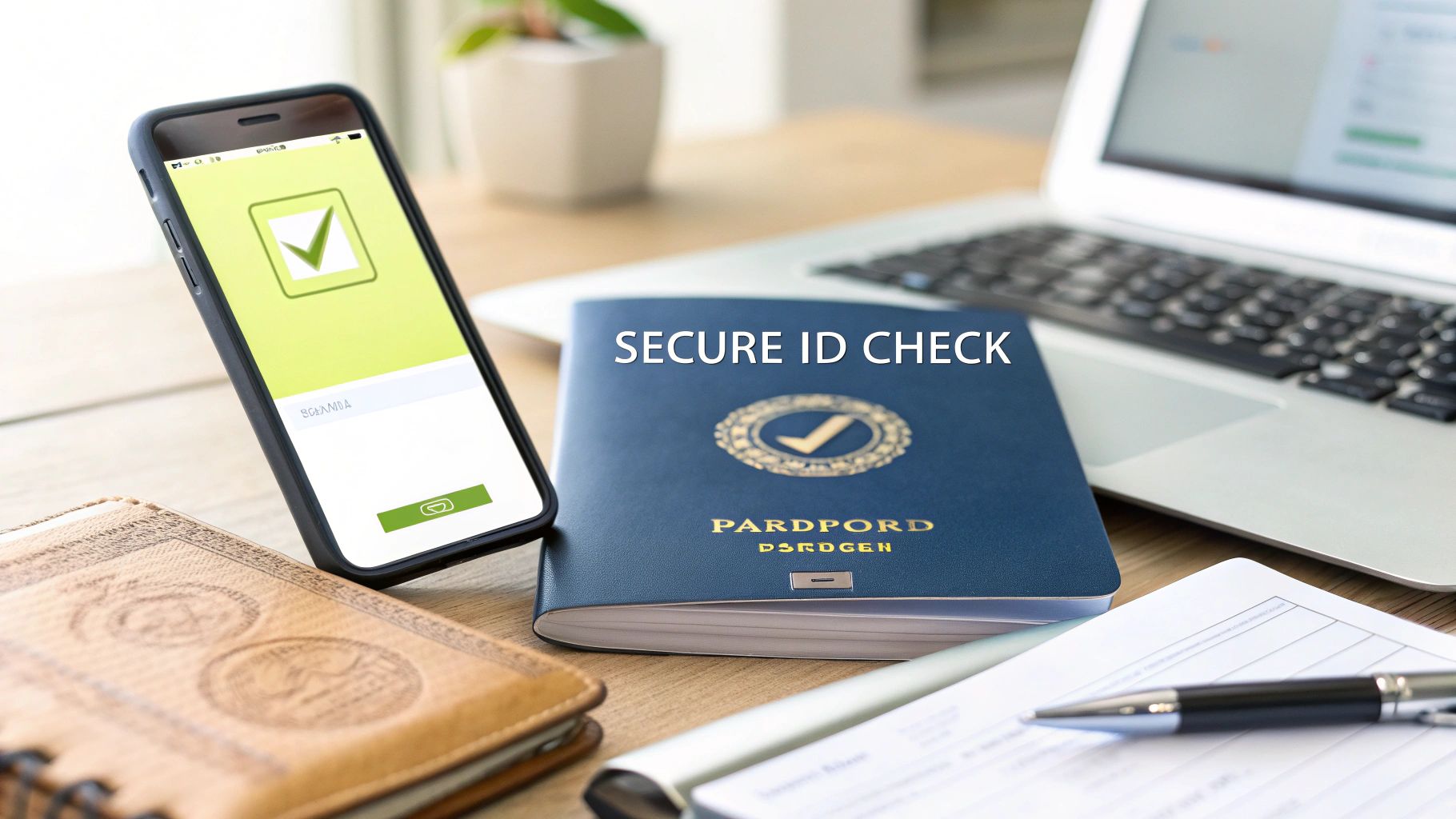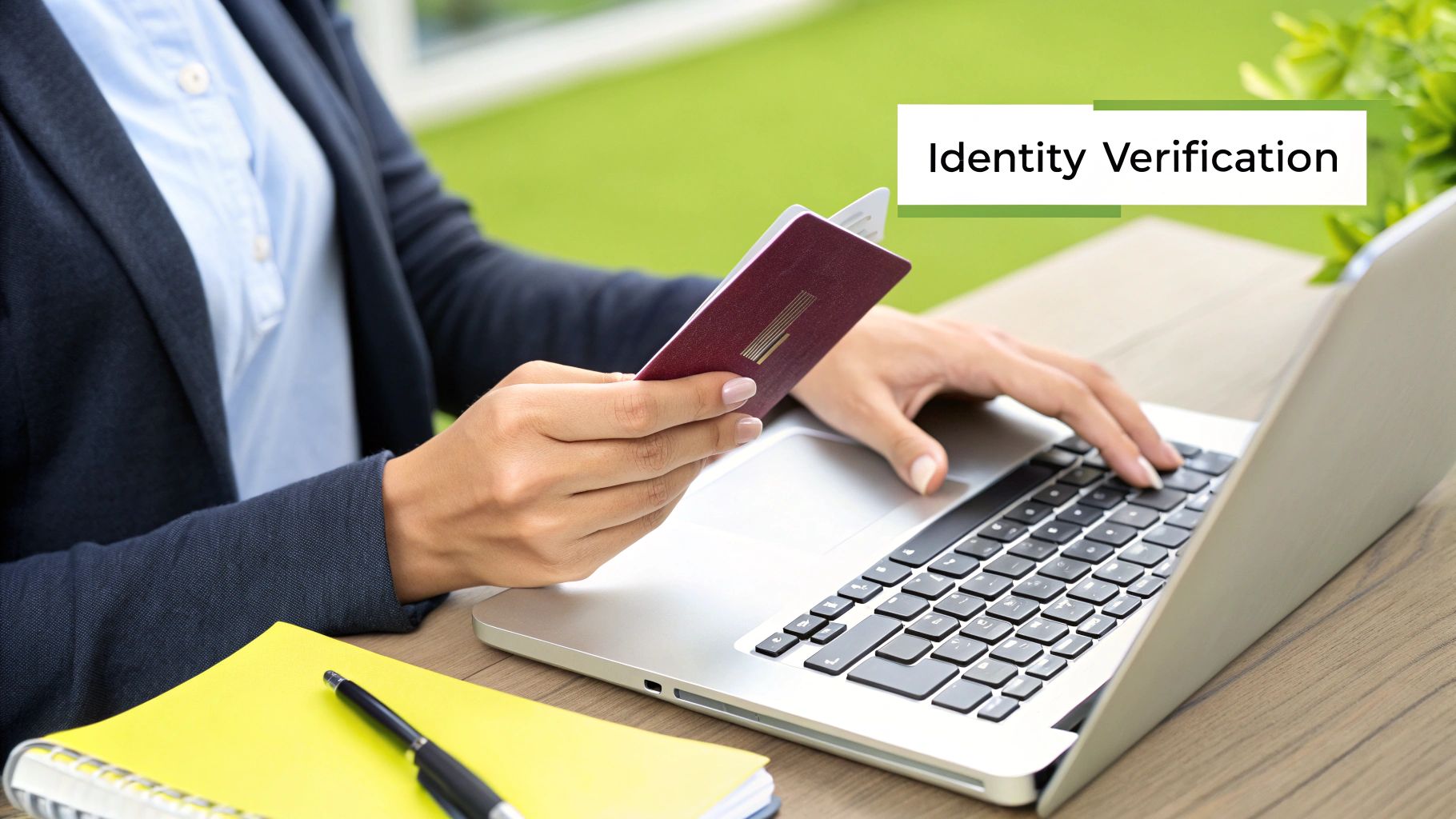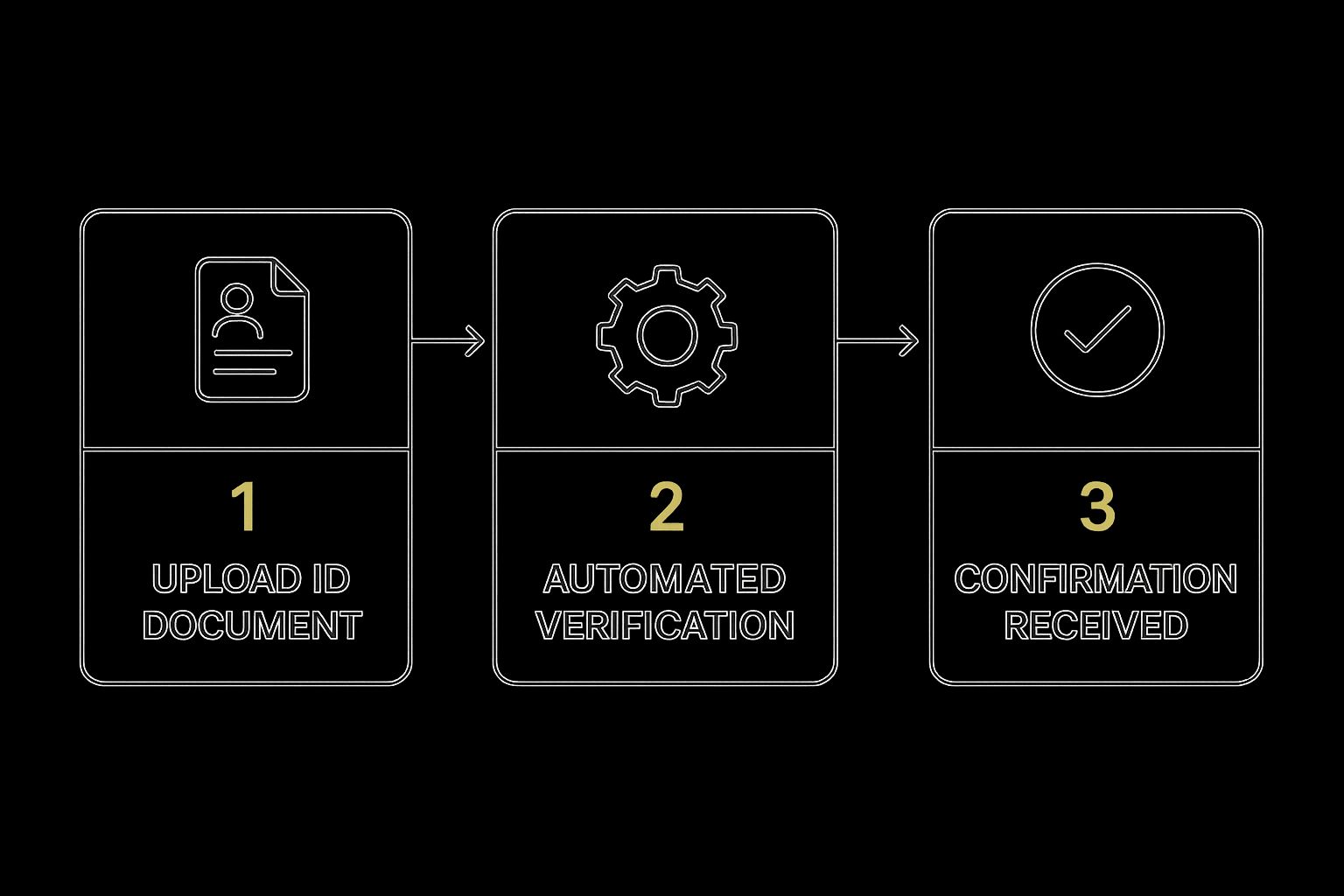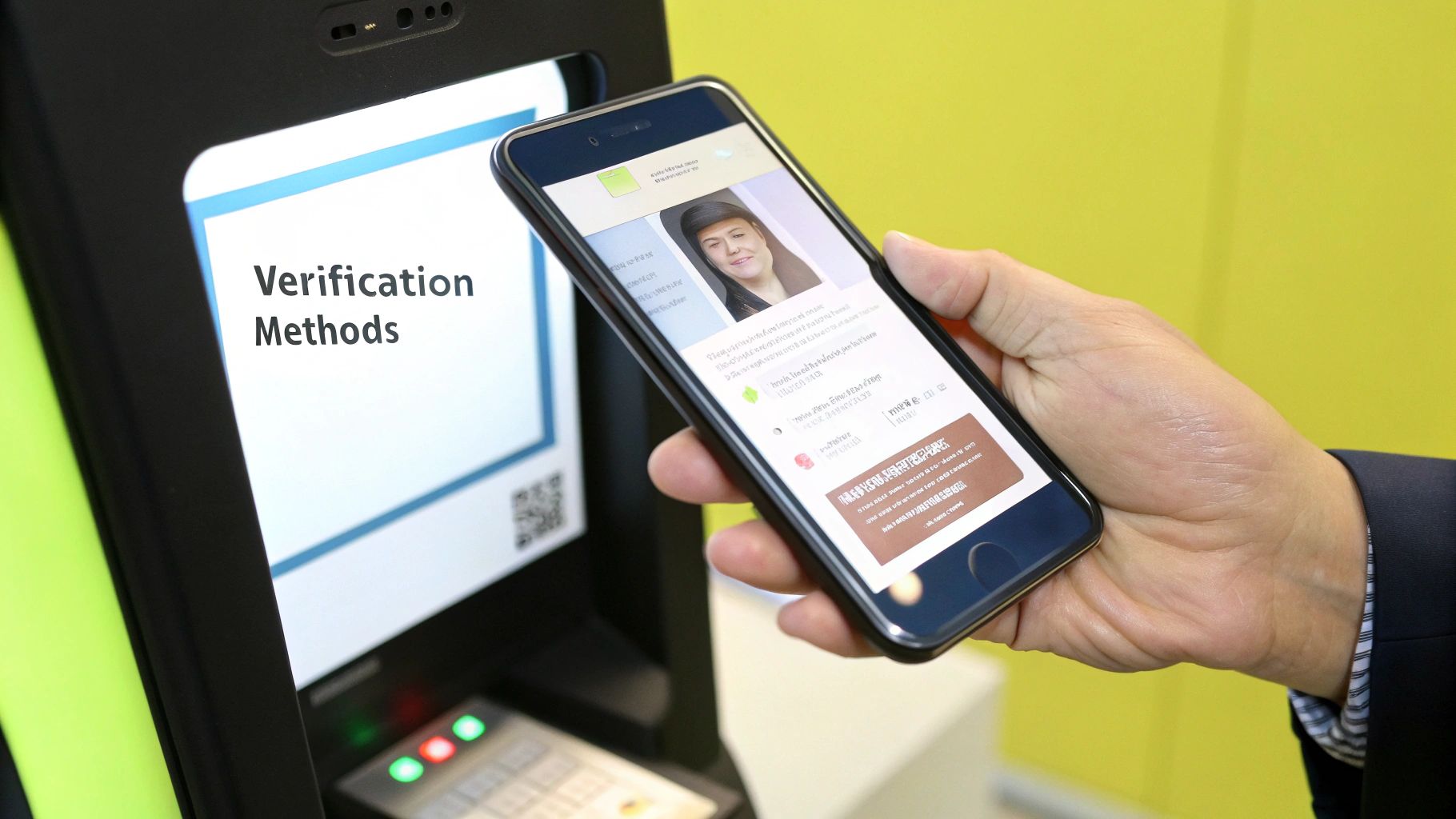
If you're involved in running a UK company, you've probably heard about the new Companies House ID verification rules. This is a major change, making it mandatory for company directors, Persons with Significant Control (PSCs), and members of LLPs to officially confirm who they are.
This requirement is part of the new Economic Crime and Corporate Transparency Act (ECCTA). At its heart, it's all about increasing transparency and cracking down on economic crime by making sure the people behind UK companies are real and accountable.
For years, the UK's company register has operated on a system based largely on trust. The government's new rules change all of that, moving us to a system where anyone registering or managing a company has to prove their identity. The main goal here is to clamp down on fraud, money laundering, and the use of anonymous shell companies for criminal activity.
Think of it as Companies House adding a 'verified blue tick' to every director's profile. Previously, it was alarmingly easy for someone to use a fake name or register a fictitious director, which seriously undermined the integrity of the public register. The new Companies House ID verification process is designed to put a stop to this, making it far tougher for criminals to hide behind fake corporate structures.
The central hub for all these new regulations is the GOV.UK page for Companies House, which is the official source for guidance.

This page is your go-to for all official information and services for company registration and compliance, including these new identity checks.
The net for who needs to verify their identity is cast pretty wide, so the first step is to figure out if these rules apply to you.
The new verification process is mandatory for:
All new and existing company directors.
All Persons with Significant Control (PSCs).
Members of Limited Liability Partnerships (LLPs).
Anyone who files information with Companies House on a company's behalf.
This isn't just a minor bit of admin. It's a fundamental overhaul of the UK's business landscape. The ECCTA gives Companies House genuine teeth to challenge and remove dodgy information, which in turn should boost confidence in legitimate UK businesses.
To help clarify things, here’s a quick summary of the main changes.
This table shows at a glance who is affected and what they need to do. While some deadlines are still being confirmed as part of the phased rollout, the direction of travel is clear: verification is coming for everyone in a key role.
The changes are being rolled out in phases, but key deadlines are on the horizon. The initial response from the business community has been positive, showing that people are taking this seriously.
A voluntary identity verification scheme kicked off in April 2025, and by early August 2025, over 300,000 individuals had already verified their identities. This impressive uptake happened even before the process becomes mandatory on 18th November 2025 for all new director appointments. For the latest official timelines, it's always worth checking the government's progress updates.

The introduction of mandatory Companies House ID verification isn't just another box-ticking exercise. It's a direct and necessary response to a problem that's been bubbling under the surface for years. For a long time, the UK company register pretty much ran on an honour system. While this was great in theory, it left the door wide open for criminals to exploit.
This trust-based model made it shockingly easy for bad actors to appoint fake directors, use made-up addresses, or create tangled corporate structures to hide who was really in charge. These loopholes effectively turned some UK companies into tools for serious economic crimes, like money laundering and funding terrorism. The new rules, brought in by the Economic Crime and Corporate Transparency Act (ECCTA), are designed to slam that door shut for good.
At its heart, this whole reform is about bringing back total integrity to the UK’s public company register. Think about it – a reliable register is vital for a healthy economy. It gives investors, suppliers, and even your customers the confidence that they're dealing with real, accountable people.
When criminals can operate in the shadows, it chips away at that confidence and tarnishes the UK's reputation on the world stage. By demanding ID verification, the government is essentially building a digital fortress around the register, making it far tougher for crooks to hide. This isn't just creating more red tape; it's a critical security upgrade for the entire UK business world.
This is a huge deal. These ID verification rules are part of the most significant shake-up of the UK company registration system since it was first established way back in 1844. The ECCTA lays out a clear roadmap for modernising the system, with these checks being the cornerstone of the new, more secure framework.
The fallout from the old, lax system wasn't just theoretical. It caused real, tangible harm that made life difficult for legitimate businesses.
Shell Companies: Criminals could set up shell companies in a flash, appointing nominee directors who were directors in name only. These were then used to funnel illicit cash.
Fraudulent Addresses: Registered offices could be listed at non-existent locations or at properties where the real owners had no idea their address was being used, creating a smokescreen for illegal activities.
Identity Theft: People discovered their names and personal details had been used to register them as company directors without their knowledge, wrongly connecting them to fraudulent operations.
By tackling these issues head-on, the Companies House ID verification process is here to protect honest entrepreneurs and the public. It ensures that when you start a business in the UK, you're stepping into a marketplace built on transparency and fairness.
Ultimately, this move towards corporate transparency is all about creating a safer, more dependable business landscape. It reassures everyone, from global investors to local suppliers, that UK companies are run by real people who can be held accountable. This change strengthens the very foundation of the UK economy, safeguarding its integrity for the future.
So, you need to get your ID verified with Companies House. It's a crucial step, but thankfully, it isn't as complicated as it might sound. You've got two main ways to get it done, and which one you pick really just depends on what works best for you and your business.
Think of it like getting your passport checked at the airport. You can either use the fast, automated e-gates (the direct route) or head over to a border agent for a manual check (the indirect route). Both get you through, but the journey is a little different.
The most common route, and the one most people will use, is direct verification through the government's own digital system. It's quick, it's free, and it's designed for you to handle yourself in just a few minutes.
To go down this path, you'll need three things to hand:
A GOV.UK One Login Account: This is your digital key for accessing all sorts of government services, including this one.
A valid photo ID: A UK passport or a UK driving licence (provisional ones are fine too) is what you'll typically need.
A device with a camera: Your smartphone will be perfect, but a computer with a webcam works just as well.
The process is pretty slick. You'll be asked to take a clear photo of your ID document and then record a short video or take a "live" photo of your face. This is a biometric check where the system cleverly compares your face to the photo on your ID, making sure you are who you say you are.
This graphic gives you a good idea of how simple the automated process is.

As you can see, once you've submitted your ID, the system's automated checks do the heavy lifting before sending you a confirmation. It’s designed to be efficient and pretty painless.
Your second option is to do your Companies House ID verification via an Authorised Corporate Service Provider (ACSP). These are third-party businesses, often accountants or legal firms, that have been officially approved by Companies House to carry out identity checks on your behalf.
Well, there are a few good reasons:
Sheer convenience: If you already use an accountant for your company filings, letting them handle your ID check just slots neatly into the services they already provide for you.
Multiple directorships: If you're a director for several different companies, an ACSP can centralise the whole verification process and save you a lot of hassle.
Technical hiccups: If you're struggling with the digital service, or maybe you don't have the right kind of ID, an ACSP offers a reliable backup plan.
Going through an ACSP is like having an expert guide you through the paperwork. They take on the admin burden and make sure it’s all done correctly, though you can expect to pay a fee for their time and expertise.
Once you're verified, it has a direct and positive impact on your company's official standing. For instance, being verified is becoming a must-have when you need to set up a business bank account, as banks are increasingly looking for this layer of security.
Ultimately, both paths lead to the same destination: getting that all-important 'verified' status on the public register. The key is to pick the one that fits your personal preference and business setup. For most directors, the direct digital route is the quickest win, but the ACSP option provides fantastic support for those who need it.

While verifying your ID directly is a solid option for many, it’s not the only way to get it done. The new rules have introduced a vital new player to the game: the Authorised Corporate Service Provider, or ACSP. This gives you a crucial alternative for completing your Companies House ID verification.
Think of an ACSP as an officially approved 'verifier' who can act on your behalf. These aren't just any businesses; they are established, regulated firms already subject to UK Anti-Money Laundering (AML) supervision. This typically includes accountancy firms, company formation agents, and legal practices you might already be working with.
The creation of the ACSP status is a cornerstone of the new regulations. It’s there to make sure that any third party filing information or checking identities for clients meets a high professional standard and is fully accountable to Companies House.
Becoming an ACSP isn't a walk in the park. These providers have significant responsibilities and are held to a very high standard by Companies House to protect the integrity of the public register.
To become an ACSP, a firm must first be supervised by one of the UK’s 25 official Anti-Money Laundering bodies. This is a non-negotiable prerequisite that ensures they’re already operating within a strict regulatory framework designed to combat financial crime.
Their key duties involve carrying out thorough due diligence when checking a client's identity and keeping detailed records of every check they perform. This creates a clear audit trail and adds a robust layer of security to the whole system. If an ACSP fails to meet these standards, Companies House has the power to suspend or even remove their status, which keeps the system trustworthy for everyone.
Navigating the new Companies House ID verification rules can feel pretty straightforward, but a few common tripwires can catch out even the most organised directors. Being prepared is your best defence against delays, headaches, and potential penalties. Let's walk through the frequent missteps so you can ensure a smooth and successful verification process.
One of the easiest mistakes to make is using expired ID. It’s like getting all packed for a holiday only to realise your passport expired yesterday – a simple but incredibly frustrating mistake. Always double-check the expiry date on your passport or driving licence well before you even think about starting the verification.
Another big one is running into technical glitches. While the GOV.UK One Login system is generally solid, things can still go wrong, from a dodgy internet connection to an incompatible phone or browser. Don't leave verification to the eleventh hour. That leaves you zero time to troubleshoot if the system decides not to play ball.
The most serious pitfall, by far, is simply failing to verify your identity before the deadline hits. The consequences aren't just a slap on the wrist; they can have a real impact on your business and your personal standing. Ignoring these rules can lead to fines or even prosecution, turning a simple compliance task into a serious legal headache.
Your status on the public register will be marked as 'unverified', which can seriously damage your company's credibility with banks, suppliers, and customers. Think of it as a red flag next to your name that signals potential risk to anyone looking to do business with you.
To sidestep this, get those deadlines marked in your calendar now and set plenty of reminders. If you're a director for multiple companies, it might be worth considering an Authorised Corporate Service Provider (ACSP) to manage compliance and ensure nothing slips through the cracks.
A bit of preparation is all it takes to make this a hassle-free experience. Here are a few practical steps to help you sidestep these common issues:
Document Check: Before you start, pull out your photo ID and confirm it’s valid and in decent condition. If it's getting close to its expiry date, get it renewed first. This one simple check can prevent an immediate failure.
Tech Prep: Make sure you have a stable internet connection and a device with a working camera. If you keep hitting a wall with the digital service, remember that the ACSP route is an excellent and reliable alternative.
Stay in the Loop: These new rules are designed to clean up the company register, and Companies House is actively enforcing them. Since January 2025, they have already taken action on 75,600 companies to tackle fraud, including deleting over 60,700 suspicious addresses and removing 9,500 false documents. It shows they mean business, and staying informed about these actions helps you understand why this is so important.
By getting ahead of these challenges, you can navigate the Companies House ID verification process without breaking a sweat. For business owners, staying on top of regulatory changes like this is just one piece of the puzzle. You can also explore our guide on tax advice for small businesses to make sure your financial compliance is just as solid.
We get it. These new Companies House ID verification rules can feel a bit confusing at first, and you probably have a few specific questions bubbling up. Let's get them answered so you know exactly where you stand.
Let's be blunt: ignoring the verification deadline is a very bad idea. This isn't just about a slap on the wrist or an administrative rap on the knuckles. The consequences are serious.
Any director who doesn't verify their identity will have their status on the public register flagged as 'unverified'. This is a huge red flag for anyone looking to do business with you, from banks and investors to suppliers and customers. It immediately damages your company's credibility.
But it gets worse. Continued failure to comply is considered a criminal offence. This could lead to hefty fines or even prosecution. On top of that, Companies House has the power to block unverified individuals from being appointed as directors in the future, effectively stopping you from running a company. It's absolutely crucial to get this done on time.
If you're a director living outside the UK, you have the exact same responsibility to verify your identity as your UK-based colleagues. There’s no special exemption.
The main way to do this is still through the digital service using a GOV.UK One Login. It’s built to handle a wide variety of international ID documents.
However, we know tech isn't always perfect, and sometimes a specific type of ID might not be supported. If you run into any trouble, there's a straightforward alternative. Your best bet is to use an Authorised Corporate Service Provider (ACSP). Many UK accountancy and legal firms are registered as ACSPs and are completely up to speed on helping international clients navigate these requirements.
This is a big concern for many directors, and thankfully, the answer is a clear and simple no. The personal information you provide to get verified—things like your passport number or the biometric data from a facial scan—will not be splashed all over the public register.
That data is used for one thing and one thing only: for Companies House to confirm, internally, that you are who you say you are. The public register will simply show a small, clean marker confirming your identity has been verified.
It’s all about striking a balance between creating more transparency and protecting your sensitive personal data.
At GenTax Accountants, we take data protection incredibly seriously. To see how we look after our clients' information with the highest level of care, you can learn more about our team and principles by visiting the GenTax about us page.
How much it costs to get verified comes down to which route you take. You have two options, each with a different price tag.
Direct Verification: If you do it yourself using the GOV.UK One Login digital service, it's completely free of charge.
Indirect Verification: If you decide to use an Authorised Corporate Service Provider (ACSP), like your accountant, they will almost certainly charge a fee. This covers their professional time, the due diligence checks they have to carry out, and their own admin costs.
At GenTax Accountants, we make compliance straightforward. Our expert team can guide you through the verification process and manage all your other accounting needs, from tax returns to bookkeeping. Get in touch today for a free consultation.